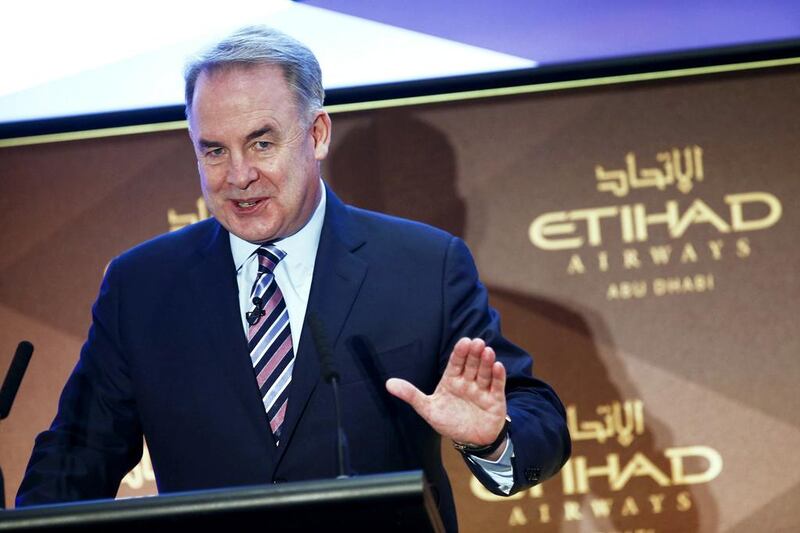London // Etihad Airways’ chief executive hit out at the protectionist mood in Europe and the United States on Thursday, warning that the ultimate price of any action taken against Arabian Gulf airlines would be the impact on the future growth of the global aviation industry.
“The dark clouds of protectionism are gathering,” James Hogan said at an event in London. “Five mega-carriers are trying to pull the ladder up after years of having it their own way.”
US and European carriers have urged their respective regulators to address the issue of unfair competition. They claim that Emirates Airline, Etihad Airways and Qatar Airways receive subsidies from their governments – an allegation that has been strongly denied.
Last week Mr Hogan and Tim Clark, the Emirates president, were in Washington to hit back at the claims made against them by Delta, United and American airlines, and their trade unions in the US.
The US airlines had prepared a 55-page document, which they released in late January, detailing allegations of unfair government subsidy and other financial incentives that they claim were in breach of open skies agreements.
The European Commission also stepped into the spat this month.
During a meeting of transport ministers from the European Union, the French and German representatives asked the commission to address the subject of government subsidies during discussions over a commercial aviation agreement with the Gulf this year.
Lufthansa and other European carriers have called for a halt to approving new routes for Gulf airlines.
On Thursday, Mr Hogan warned that as the debate “heats up around the world” the industry is in danger of losing sight of the fact that competition stimulates growth, both for the sector and for the economies that gain millions of dollars from the increased trade links that follow new aviation routes.
“Some of the carriers attacking us claim they are losing market share. We have started some analysis on this issue and although the detailed study will take some time to complete, I can say that our initial studies already suggest that those claims are true,” said Mr Hogan.
“They are getting a smaller slice, it is true. But it is a slice of a bigger cake. And the bigger cake is proof that more people are able to travel – more consumers are getting the benefits of competitive choice.”
Mr Hogan said that the one thing missing from the row is any thought for the customer.
Airline customers want competition, he said.
“People want choice when they travel. Choice means they know things will constantly improve. That’s the same whether you are sitting in Abu Dhabi or in London, Manchester or Edinburgh,” he added.
Mr Hogan said that while the US carriers mentioned the issue of subsidies 42 times in their report, the customer was mentioned only once.
“The people that will really lose if these giant legacy airlines are successful are the millions of travellers benefiting from the new choice in the global air travel market.”
The International Air Transport Association (Iata) said in February that global passenger demand rose 5.9 per cent last year compared to 2013 – above the 10-year average growth rate of 5.6 per cent – with more than half of the growth in airlines in emerging markets such as Asia-Pacific and the Middle East.
Iata has also projected a rise in the industry’s global profit to US$25 billion this year from $19.9bn last year.
There is a risk of this demand softening as business confidence falls, said Tony Tyler, Iata’s director general and chief executive.
Chinese domestic demand, which fuelled much of the stellar growth last year, may be affected by a slower rate of economic growth this year in the world’s second-largest economy.
However, the North American market is expected to show a strong performance this year because of higher demand for travel, an improving labour market, consolidation and weak oil prices.
Europe and the US potentially stand to lose out on billions of dollars of aircraft orders that create jobs and drive innovation if their carriers persuade authorities to curb the expansion of Gulf airlines, according to analysts.
“The stark reality is that the US and the EU cannot realistically elect to stifle the growth of Gulf airlines,” says Saj Ahmad, the chief analyst at StrategicAero Research. “US and EU airlines operate outdated and debt-heavy airlines and are reluctant to wake up and change.”
malrawi@thenational.ae
Follow The National's Business section on Twitter






